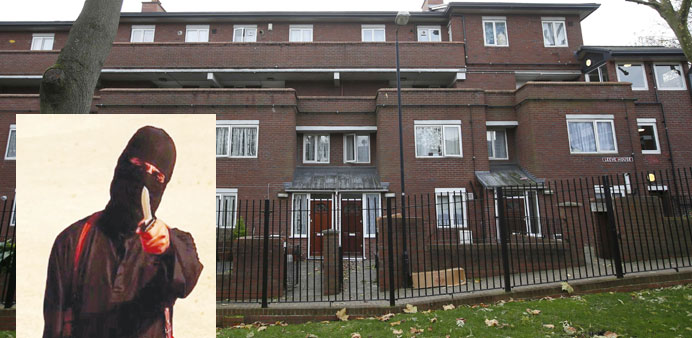A view of the house in London where the family of British IS member Mohamed Emwazi lived before he was identified. Inset: A file image grab of Mohamed Emwazi, taken from a video released by the Islamic State (IS) group.
By Weedah Hamzah and Bill Smith/DPA/Beirut
Mohamed Emwazi, the masked man with a British accent who taunted the West in Islamic State (IS) beheading videos, is reported to have been killed in a US drone strike. The question of what sent him down the path of radicalism is still unanswered.
Emwazi, better known as “Jihadi John”, was born in Kuwait in 1988. A British man of Iraqi origin, Emwazi moved with his family to Britain in 1993 after they had failed to obtain Kuwaiti citizenship.
He grew up in North Kensington, an area of west London. As a child, he was a fan of Manchester United football club, according to British media.
The former headteacher of Emwazi’s high schoool, Jo Shuter, told the BBC he was “reasonably hardworking” pupil who showed no signs of being drawn to extremism.
He later studied information technology at the University of Westminster, graduating in 2009.
Emwazi was nicknamed “Jihadi John” by British and US media following his first appearance wearing a mask in a video in August of 2014 showing the beheading of James Foley, an American freelance journalist who had been missing in Syria since November 2012.
The beheading video was titled “a Message to America”.
At the time, the Islamic State announced that Foley was killed because US President Barack Obama ordered airstrikes against the extremist group in Iraq.
With his distinct British accent, Emwazi appeared in other Islamic State videos wearing black outfits and a mask, and carrying a knife, taunting and killing more hostages.
The victims included US journalist Steven Sotloff, American aid worker Peter Kassig, British aid workers David Haines and Alan Henning, Japanese reporter Kenji Goto and Japanese security consultant Haruna Yakwa.
Emwazi is believed to have directed all the execution videos released by Islamic State, according to Syrian activists.
Another former hostage, French journalist Didier Francois, told French radio station Europe 1 yesterday that Emwazi was one of four British jailers of 19 foreigners seized in Syria in 2013.
Emwazi was one the most violent guards, who “hit and tortured without the slightest restraint”, Francois told the broadcaster.
The hostages nicknamed the four British guards “the Beatles” because they did not know their names, he said, adding that Emwazi was named after Beatle John Lennon.
London-based rights group CAGE, which says it works to oppose arbitrary detention and torture and “empower communities impacted by the War on Terror”, said Emwazi appeared to have been radicalised by a “culture of abuse” from security services.
Emwazi “desperately wanted to use the (legal) system to change his situation, but the system ultimately rejected him,” Asim Qureshi, CAGE’s research director, said earlier this year.
CAGE said Emwazi first contacted it in mid-2009, following his deportation with two friends from Tanzania, where he said he had planned to go on a safari.
Security agents accused him of planning to travel from Tanzania to Somalia to join the Al Qaeda-linked Al Shebaab group.
Emwazi later complained that he was refused a visa for Kuwait, his country of birth, after intervention by British security agents.
He said the security services also contacted his fiancee in Kuwait, causing her family to cancel wedding plans, and threatened him and attempted to recruit him as a spy.
Qureshi said Emwazi had appeared to be “kind, gentle and soft-spoken” during two and half years of contact with the rights group.

